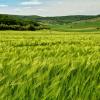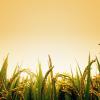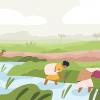
Towards sustainable food and land-use systems: The Food, Agriculture, Biodiversity, Land, and Energy (FABLE) Consortium.
Deep transformations of human systems are necessary to sustainably secure basic human needs and advance human welfare while managing the risks from global environmental change. This requires reconciling multiple social, economic, and environmental objectives based on a robust understanding of the implications of strategic decisions about development pathways.
To simultaneously progress towards the Sustainable Development Goals (SDGs) and the objectives of the Paris Agreement, the sustainable transformation of food- and land use systems represents a key concern. To identify solutions, it is important that actions are embedded in a strategic decision-making context, which facilitates the transition from individual efforts to broad level scale-up and transformation.
The Food, Agriculture, Biodiversity, Land, and Energy (FABLE) Consortium seeks to establish a model-aided decision-support environment for sustainable development pathways in the land use space. FABLE brings together knowledge institutions from developed and developing countries to advance the analytical capacity for strategic land use planning. The FABLE Secretariat is jointly hosted by the International Institute of Applied Systems Analysis (IIASA) and the Sustainable Development Solutions Network (SDSN), working closely with the EAT Forum, the Potsdam Institute for Climate Impact Research (PIK) and the Alliance of Bioversity International and CIAT. While managed independently, FABLE is also part of the Food and Land Use Coalition, which brings together a broad range of stakeholders to advance transitions towards sustainable food and land use systems.
Through its focus on systems-based approaches and integrated assessments, FABLE can help to advance the understanding of which strategic decisions can benefit the overall transformation of food and land use systems towards sustainability. By engaging multiple country partners, FABLE also aims to improve insights into interactions between regional and country scale pathways with global scale concerns.
Activity lines focus on i) cross-sectoral capacity development and sharing of best practice for data management and modeling of land use interactions (including simplified models of land use and food systems for stakeholder engagement; integration of geospatially explicit biophysical and socioeconomic data for integrated assessment modeling; and technology roundtables for sharing advances in technology applications which influence modeling assumptions), ii) development of national pathways, which are also cognizant of globally agreed targets and account for the implications of trade assumptions; and iii) analytical support to national and international policy processes.
The current focus is on establishing and expanding the analytical capacities of countries for integrated assessments. FABLE takes a long-term time horizon to explore the implications of strategic decisions. The aim is to delineate the solution space for sustainable development pathways, which realize national development aspirations while also accounting for globally agreed targets. Informed by the 2030 Agenda for Sustainable Development and the Paris Agreement, FABLE country teams identify collective targets for sustainable food and land use systems. Guided by these targets and taking into account national development aspirations, country teams then set out to frame national development pathways until the middle of the century. For this purpose, FABLE provides a model-aided environment for scenario development, integrated analysis, and stakeholder dialogue, allowing for an iterative process, which enables countries to make joint progress towards their collectively agreed targets. To date, teams covering 20 countries and the EU have participated in scenario and development pathway planning exercises called Scenathons.
Our new FABLE 2020 report presents the most recent advances, and can be downloaded from the IIASA Pure repository.
Dive in the data and results of the Scenathon FABLE 2020 through the interactive global dashboard.
Publications
Resilience and the Transformation of Food and Land Use Systems
FABLE (2020). Pathways to Sustainable Land-Use and Food Systems. 2020
Report of the FABLE Consortium. International Institute for Applied Systems Analysis (IIASA) and Sustainable Development Solutions Network (SDSN) , Laxenburg and Paris. 10.22022/ESM/12-2020.16896.
FABLE (2019). Pathways to Sustainable Land-Use and Food Systems. International Institute for Applied Systems Analysis (IIASA) and the Sustainable Development Solutions Network (SDSN) , Laxenburg and Paris.
FABLE (2022). Pathways for food and land use systems to contribute to global biodiversity targets. FABLE Policy Brief. Alliance of Bioversity International and the International Center for Tropical Agriculture & Sustainable Development Solutions Network (SDSN) , Montpellier/Paris, France.
FABLE (2021). Environmental and agricultural impacts of dietary shifts at global
and national scales. FABLE Policy Brief. Alliance of Bioversity International and the International Center for Tropical Agriculture & Sustainable Development Solutions Network (SDSN) , Montpellier/Paris, France.
Sperling, F., Rumbaitis del Rio, C., & Laurien, F. (2022). Resilience and the Transformation of Food and Land Use Systems. Discussion paper prepared for the Food and Land Use Coalition (FOLU). International Institute for Applied Systems Analysis (IIASA) and Concept Resilience
News

24 January 2023
Supporting evidence-based policymaking in The Gambia

03 December 2020
